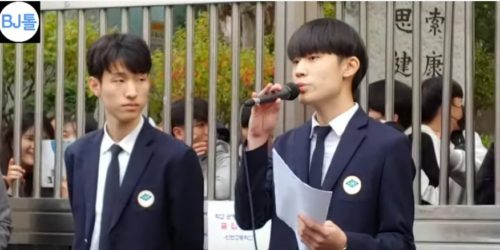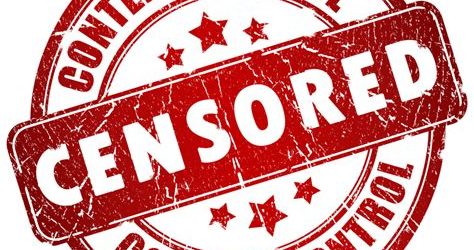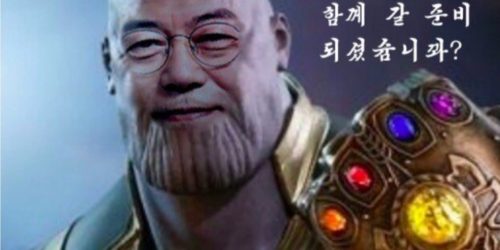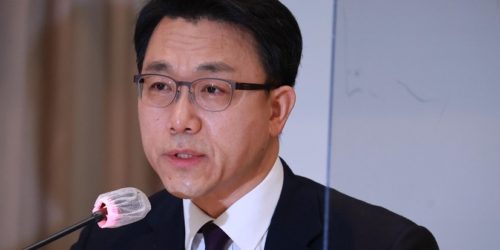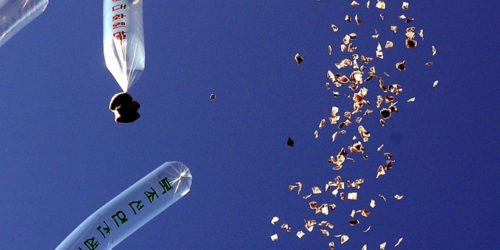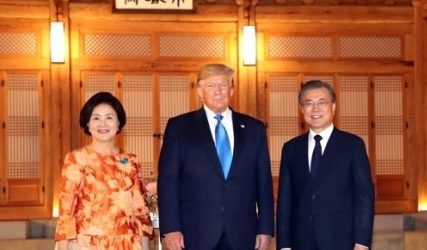Unelected Representatives, Gongsoocheo to Undermine South Korea’s Identity as a Republic and Separation of Powers; Hunger Strikes by the Opposition Leader Hwang and Others
2019-11-30, Tara O
There are multiple hunger strikes ongoing in South Korea in front of the Blue House. Why are people on hunger strikes? It has to do with proposals set forth by the ruling party and its coalition that will undermine separation of powers and harm South Korea’s identity as a republic: a law to create a new investigative unit targeting senior officials (Gongsoocheo) and a Semi-interlocked Proportional Representatives Election System Amendment.
The two dangerous proposals
- Gongsoocheo (“senior official corruption investigative organization”), 고위공직자범죄수사처 (공수처)
Creating Gongsoocheo, an organization that Investigates senior government officials for corruption, initially does not sound like an issue worthy of a hunger strike, until one discovers what it really is. The Moon administration and his supporters at the legislature do not explain to the public what Gongsoocheo is, but rather wrap it into what they claim is a “prosecution reform.” They do not explain why Gongsoocheo is needed when there are the prosecutors, inspector generals, and other investigative bodies at various government entities. It also does not explain what Gongsoocheo implies.
Gongsoocheo gives the president greater power in investigating other senior officials, including judges, prosecutors, and police chiefs. It can be misused directly by the president to target his political opponents, suppress freedom of speech, and generally create an atmosphere of fear–all for greater control. North Korea’s Ministry of State Security is used for a similar purpose in that it targets the power elites, instills fear, and is a tool for the leader to control the elites.
The president appoints the head of Gongsoocheo and the key members of Gongsoocheo would be politically tilted toward Moon Jae-in. The previous version of Gongsoocheo proposal identified all the senior officials as subjects of investigation for corruption. In the ruling Deobureo Minjoo Party’s (Democratic Party of Korea) version of Gongsoocheo, the president, his extended family, and the lawmakers are not targets of Gongsoocheo’s investigation.
The parties that are supporting Gongsoocheo proposals are already in line with Moon Jae-in’s wishes. Although there are numerous political parties, many of them share the same ideology and policy direction as Moon Jae-in and his party. This prompted Hwang Kyo-ahn, the leader of the main opposition party Liberty Korea Party, to state
…they took over the administration, took over the legislature, and now the last puzzle piece left is the Gongsoocheo law. The Gongsoocheo law is definitely not a well-meant [piece of legislation] that punishes powerful and senior-ranking individuals (who are corrupt) according to law, [italics added for emphasis]
implying it is not about the rule of law, but a tool for political suppression. Thus, Gongsoocheo practically destroys the separation of powers within the South Korean Government–a key pillar of liberal democracy–by placing the judiciary branch under the president, which damages the liberal democratic system of South Korea. As such, Gongsoocheo is extremely dangerous for South Korea.
The demonstrators on October 3, 2019 pointed out that North Korea and China have the same type of organizations, and Nazi Germany had such an organization for “investigating” senior officials, and they strongly opposed the creation of Gongsoocheo.
In April 2019, Moon’s Deobureo Minjoo Party (Democratic Party of Korea) and three smaller parties excluded the main opposition party (Liberty Korea Party) and joined together in placing the Gongsoocheo proposal on a “fast track” process (requires less number of votes to pass by placing it on a fast track) of passing bills at the National Assembly. The three smaller parties are:
- Justice Party (split from the now-banned Unified Progressive Party or UPP; The KCTU labor union is its political base)
- Democratic Peace Party/Minjoo Peace (which split from the People’s Party)
- Bareun Mirae Party (one part split from the People’s Party, and another part split from the former Saenuri Party, which is now the Liberty Korea Party, after voting to impeach Park Geun-hye).
Although technically they are considered “opposition” parties, the Justice Party, Democratic Peace Party, and about half of the Bareun Mirae Party share a similar outlook and policy direction as the Deobureo Minjoo Party (Democratic Party of Korea).
Since placing the Gongsoocheo proposal on the fast track, another small party New Alternative Party (대안신당), was created on November 28, 2019, and it may also support the Gongsoocheo proposal. This party was split from the Democratic Peace Party.
For more on Gongsoocheo, see here.
- Semi-interlocked Proportional Representatives Election System, 준연동형 비례대표제 선거법
What is the Semi-interlocked Proportional Representatives Election System and why is this also worth people risking their lives? It is a means to increase the number of proportional representatives. Proportional representatives (비례대표) are not elected by people’s votes, but rather appointed by the key leaders of each political party. The proportional representatives, therefore, are not accountable to the voters, but to the party official who appointed them, and therein lies the problem. The proportional representatives would likely support bills and positions of the particular individuals who appointed them. With less accountability to the citizens, it undermines representative government and weakens the republic, which South Korea is–the Republic of Korea.
On December 12, 2017, Sim Sang-jung (심상정), the leader of the Justice Party, announced proposing an amendment to the Public Election Act, which aimed to introduce the Semi-interlocked Proportional Representatives Election System. The amendment changes “the current multi-sectoral, simple majority representation system into a semi-interlocked electoral system that reflects public sentiment.” The amendment sets the elected representatives to proportional representatives ratio to 2:1, and raises the total number of representatives from 300 to 360 (240 districts, 120 proportional representatives). Currently, there are 47 proportional representatives, or 15.7% of the lawmakers, in South Korea. This system is designed to benefit smaller parties, which are likely to get the sudden increases in proportional representatives, at the expense of larger parties–Deobureo Minjoo Party (Democratic Party of Korea) and the Liberty Korea Party.
The Justice Party expects the biggest gain in additional slots for proportional representatives if the amendment passes. The proportional representatives are based on how many votes the party receives overall throughout the country, not by each voting district. Thus, even if the party supporters are small in number within each voting district, adding the total throughout the country and giving that portion more weight in producing proportional representatives benefit the smaller parties. With the backing of the pro-North Korea and militant Korean Confederation of Trade Unions (KCTU), which has 1,000,000 members, well-funded resources, excellent organizational skills, as well as no fear of the police when using violence, the Justice Party expects it is well-situated to receive the windfall.
Sim’s proposal not only increases the number of proportional representatives, but also the number of representatives overall.
Note: South Korea’s population is 51 million and it currently has 300 representatives, so there is 1 lawmaker for every 170,000 South Korean citizens, or .058%. By comparison, the U.S. has 327 million people and 535 members of Congress, so there is 1 lawmaker for every 611,214 U.S. citizens, or .016%.
Comparison of Lawmaker numbers in South Korea v. U.S.
| Population | Lawmakers | Citizens represented per lawmaker | Lawmakers as % of population | |
| South Korea | 51,000,000 | 300 | 170,000 | 0.058% |
| U.S. | 327,000,000 | 535 | 611,215 | 0.016% |
Sim Sang-jung claims that this “reform” reduces the privileges and increases the responsibilities of members of the National Assembly, but it is unclear how reducing accountability to the voters increases responsibility and reduces privileges; it would seem the opposite. She further stated “The National Assembly should responsibly fulfill the will of President Moon Jae-in, along with changing the Constitution, to create an election system that accurately reflects the will of the people.” It is unclear how this measure would reflect the will of the people.
On March 17, 2019, when Sim held a press conference to discuss the Semi-interlocked Proportional Representatives Election System, she could not explain the complicated formula used to determine how many proportional representatives would be created or how many each party would receive. She pointed out,
If you look at the numbers involved in the election system amendment, then it is extremely complicated; no matter how complicated the formula, the computers can calculate, but as of now, it’s difficult to understand.
When pressed further to explain, she said “People won’t understand the formula. A scientific mathematician needs to work on it.” When the reporters repeatedly asked “how can the citizens understand it, if we don’t understand it,” Sim stated “people don’t need the formula.” Sim, while admitting the complexity of the formula, clearly felt the public did not need to know how the proportional representative numbers are derived.
Fast tracking Election Amendment and Gongsoocheo Proposals
The latest version of the Semi-interlocked Proportional Representatives Election System proposal that the Deobureo Minjoo (Democratic Party of Korea) and the three smaller parties agreed on was to keep the 300 seats, but reduce the elected representatives to 225 and increase the proportional representatives to 75. This interlocking system is expected to reduce the number of proportional representatives of the larger parties.
Why then is Deobureo Minjoo Party forming alliances with smaller parties, including Sim’s Justice Party, to introduce the proposal to the National Assembly? The Deobureo Minjoo Party wants to pass the Gongsoocheo bill and wanted to place it on the “fast track,” which required less votes (3/5) to pass than the regular method. With the Liberty Korea Party opposing, the ruling party would not have enough votes to pass. In return, the ruling party made a deal with the smaller parties to support the Interlocked Proportional Representatives Election Act Amendment, which is expected to boost the number of proportional representatives in the smaller parties.
Not all smaller parties support the interlocking system or the Gongsoocheo creation–Our Republican Party and the Dawn of Liberty Party, which are on the right, oppose both proposals. The smaller parties on the left, however, tend to generally support the Deobureo Minjoo Party’s positions, including on issues regarding North Korea. In a sense, although not technically “one-party,” these smaller parties acting in unison with Deobureo Minjoo Party, creates a “block” that moves together, whether it be issues on North Korea or moving the economy toward greater government control and ownership.
Moon’s party and its coalition introduced both proposals into the “fast track” process, despite severe opposition, including physical blocking by Liberty Korea Party members. Physical blocking and shoving took place at the National Assembly over several days and nights, which included the proponents of the proposals using a hammer and crowbar to tear open the door to the room where proposals are introduced and resulted in the hospitalization of several lawmakers. For photos, see here. The ruling party and its coalition did succeed in introducing the proposals into the fast track process on April 30, 2019.
To protest Gongsoocheo and the Semi-interlocked Proportional Representatives Election System, Hwang Kyo-ahn (황교안), the leader of the main opposition party Liberty Korea Party, has been on a hunger strike, but is currently in a hospital due to the rapid deterioration of his health. Park Kyol (박결), the leader of the relatively new Dawn of Liberty Party, also went on a hunger strike in front of a detached house of the Blue House, and he is currently still on the hunger strike. Kim Hyeon-jin (김현진), a young entrepreneur also went on a hunger strike in addition to shaving his head.
The outcome of the proposals placed on the fast track are supposed to be announced on December 3, 2019.
Conclusion
The Semi-interlocked Proportional Representatives Election Amendment and Gongsoocheo are dangerous to the republic and the separation of powers that undergird the free democracy of the Republic of Korea.
